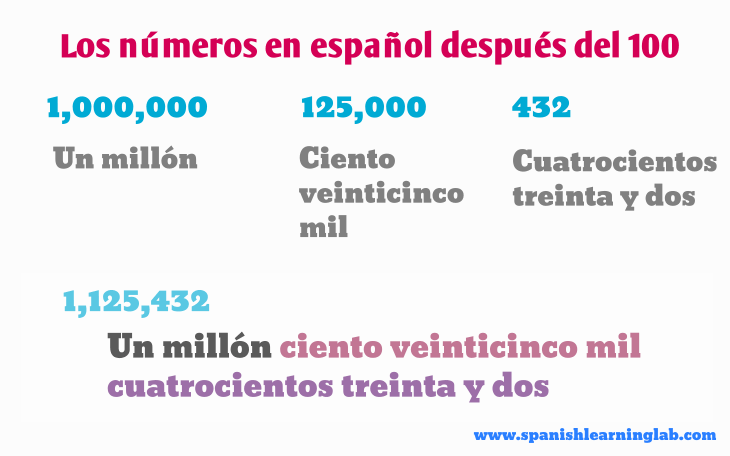¡Hola! We have already studied how to write and use numbers from 1-20 and numbers 20-100 in two independent lessons. In this lesson, we will learn about Spanish numbers over 100, “los números después del cien”, which are normally used to talk about money transactions, dates and many other purposes. This lesson includes several examples of sentences with numbers in Spanish, recordings, simple explanations and a nice quiz for meaningful practice. Let’s start…
Writing and saying Spanish Numbers 100 to 1000
The first group of Spanish numbers over 100, will be those in a range between 100 to 1000. For these numbers, we must write the words independently, similar to the way they are written after 30. Thus, we will use the conjunction “Y” to separate the last two numbers, e.g. “Doscientos cincuenta y cinco” and “Trescientos cuarenta y tres“. The number 100 by itself will be called “CIEN”, but when used with other numbers it will change to CIENTO. That being said, the number 103 would be “CIENTO TRES” not “CIEN TRES”.
Spanish Numbers 100-200
For Spanish numbers between 100 to 200 like 135, first we will use CIENTO and then we write the remaining numbers the way we did in the previous lessons. Remember 35 would be written as TREINTA y CINCO, so the final number would be CIENTO TREINTA Y CINCO. As you can see, to write and say Spanish numbers over 100 you really need to know those between 1 and 100 very well. Listen to some sentences using Spanish numbers 100-200 and try to recognize the patterns we have explained.
|
CIEN- ¿Me puedes prestar cien dólares?
Can you lend me 100 dollars?
|
|
CIENTO UNO – Hay ciento un dálmatas
There are 101 Dalmatians
|
|
CIENTO VEINTICINCO – Hay ciento veinticinco especies
There are 125 species
|
|
CIENTO OCHENTA Y NUEVE – El vestido cuesta ciento ochenta y nueve dólares
The dress is 189 dollars
|
Spanish Numbers over 200
Spanish numbers over 200 suffer a gender change to agree with the gender of the noun they modify. This means that if the number precedes a masculine noun like LÁPICES, we should say DOSCIENTOS LÁPICES, but if it precedes a feminine noun like ROSAS, then we would say DOSCIENTAS ROSAS changing the end of the number from –OS to -AS. Know that to write the numbers in-between 200 and 300, for instance, we just write “doscientos” plus numbers 1-100, e.g. “Doscientos veintiuno”. Below, there is a list of Spanish numbers over 200 and sentences using them in real situations.
| Sentences using numbers over 200 |
|---|
|
Soy el número doscientos en la fila
I am number 200 in the row
|
|
Tú eres el número doscientos diecinueve
You are number 219
|
|
Ellos son trescientos guerreros
They are 300 warriors
|
|
Hay cuatrocientas especies de tiburones.
There are 400 species of sharks
|
|
Ellos solo producen quinientos autos
They only produce 500 cars
|
|
Tenemos seiscientos dólares ahorrados
We have saved up 600 dollars
|
|
Hay setecientas personas audicionando
There are 700 people auditioning
|
|
Ella tiene ochocientas fotos famosas.
She has 800 famous pictures
|
|
Eso cuesta novecientos dólares.
That costs 900 dollars
|
|
Tengo mil años para ser feliz.
I have 1000 years to be happy
|
Writing and saying Spanish numbers over 1000
All Spanish numbers over 1000 have a cumulative behavior. To illustrate this, the number “a thousand two hundred and fifty” would translate it almost literally as “mil (1000) + doscientos cincuenta (250)”. In addition, a number such as “five thousand nine hundred and three”, would be translated as “cinco (5) + mil (1000) + novecientos (900) + tres (3)” that is “cinco mil novecientos tres”. The behavior is the same for larger numbers.

Listen to some sentences using Spanish numbers over 1000 and check the names of other specific numbers.
|
1756- Mozart nació en mil setecientos cincuenta y seis
Mozart was born in 1756
|
|
3658 – Su cuenta tiene tres mil seiscientos cincuenta y ocho seguidores
Here acount has 3658 followers
|
|
100,000 – El auto vale cien mil dólares
The car is 100,000 dollars
|
|
1,000,000 – La lluvia va a parar en un millón de años
The rain will stop in a million years
|
Listening Activity: Practice Spanish numbers over 100
Related Spanish Lessons:
- Numbers in Spanish from 1 to 20
- Numbers in Spanish from 20 to 100
- Ordinal Numbers in Spanish
- Spanish Numbers 1-20 – PDF Word Soup
- Numbers in Spanish 1 to 100 (Matching + sentences)
- Numbers over 100 in Spanish (Matching + sentences)
